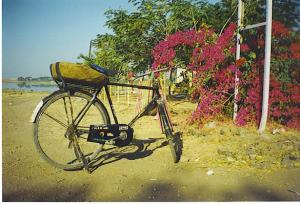by Andrea Frascione, staff writer
Walking to the grocery store, pulling a two-wheeled personal shopping cart behind you, lined with a couple of large paper bags. Leisure bicycles with an extra-wide seat and a basket up front. Bakeries and farmers’ markets. High quality, fresh meals, few and farther between. Gardening. Fishing. Making your own clothes.
You’d think this was an accurate portrait of a bygone era, when America was thin, active and healthy. When a trip to the store meant shopping for a particular item, instead of a bargain hunt for yet another useless knickknack to line your melamine bookshelf. It is indeed, but it is also a sign of our changing times: our lifestyle to come.
More and more 20-somethings are returning to a simpler time, opting for public transport and human mobility as opposed to gas-guzzlers and take-out. Contrary to what the average person may think, this ever-growing lifestyle trend isn’t just a question of economy but rather a question of health and hope. This high-tech, media-inundated generation knows full well that our reckless past will catch up to them – and their children – in the near future. It only makes sense to adopt a friendlier daily routine.
The marketplace seems to be brimming with specialty shops, and smaller family-owned businesses are getting a new lease on life. The Walmart era is coming to a close; none too soon. This young demographic scrutinizes every single item for purchase, analyzing its purpose and overall necessity, before heading to the cash register. Just ten years ago, heading to a dry cleaner or shoemaker was unheard of for this age group focused on consumption, but the advent of 2010 has that all changing – for the better.
Kids just out of school are buying more organic and less pre-packaged foods than ever before. Whether this decision is made based solely on health or the economy, it is a conscious one. Also, surprisingly, 20-something fashion fanatics are opting for fewer, well-made pieces instead of an overabundance of overseas-made clothing. Social consciousness and ethics have a great deal to do with the thought processes behind today’s post-teen market, more than ever before. Their parents, struggling to come to terms with imminent retirement, are still scrambling to recuperate what they’ve lost during the era of excess that was the 90s.
Some of these 70s ‘wild children’, having never fully grown up, are now facing some very difficult challenges on the road ahead. They could stand to learn a little from their offspring. Many find it inconvenient to have to tote their own shopping bags on sprees, and all this ‘nonsense’ about organic and recycled…we never had to recycle anything! Their own parents – many of whom were first-generation European immigrants to North America – would beg to differ. It would appear that many philosophical ideals skip a generation. If asked, many of these Allophones would express fond memories of their weekly milk-delivery, that one garment worn at countless special occasions (as it was all they could afford) and the fruits of their summer labour: the urban backyard garden. Everything had a second purpose. Nothing went to waste. As their children consumed, they secretly reused. Broken hockey sticks served as tomato plant supports in the garden, empty juice jars became the poor man’s Tupperware, and bread bag ties overflowed the junk drawer.
I, myself, an 80s child born in the city and raised in minimalist condominium communities, long for that day when I too can live as my grandparents did – in a little one-story house, with a wine cellar in the basement, a garden out back and my few, but treasured, one-of-a-kind belongings.



